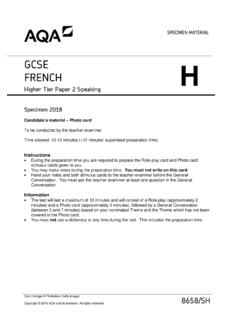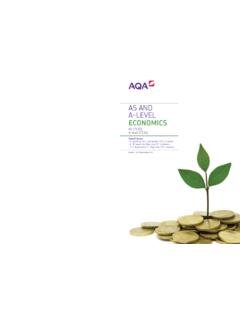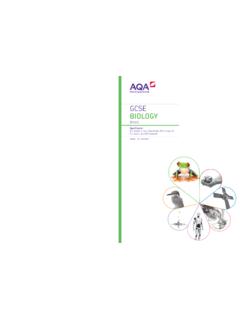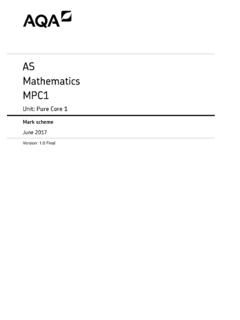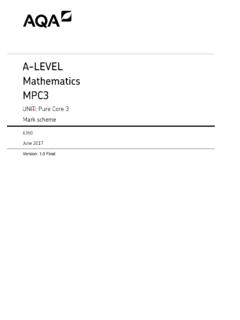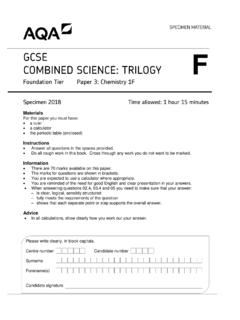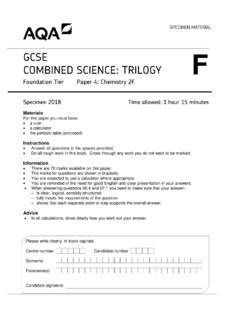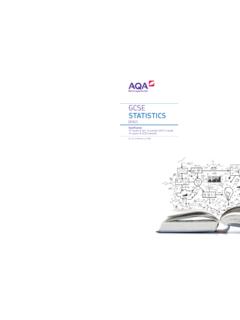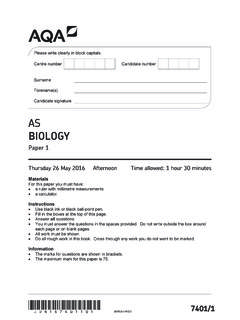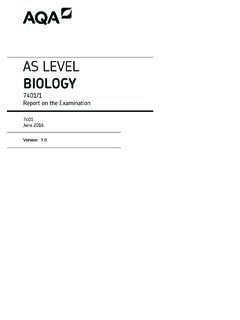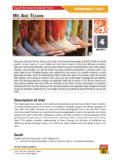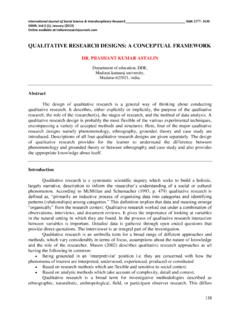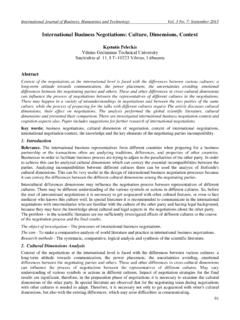Transcription of GCSE Psychology Specification Specification for …
1 GCSES pecificationPsychologyShort Course for exams June 2014 onwards and certification June 2014 onwards Full Course for exams June 2014 onwards and certification June 201 onwards4 GCSES pecificationPsychology 4180 This Specification will be published annually on our website ( ). We will notify centres in writing of any changes to this Specification . We will also publish changes on our website. The version of the Specification on our website will always be the most up-to-date version, although it may be different from printed black lines indicate a significant change or addition to the previous version of this can get further copies of this Specification from:AQA Logistics Centre (Manchester)Unit 2 Wheel Forge WayAshburton ParkTrafford ParkManchesterM17 1EH or you can download it from our website ( )Copyright 2012 AQA and its licensors. All rights retains the copyright on all its publications, including the , registered centres for AQA are permitted to copy material from this Specification booklet for their own internal Assessment and Qualifications Alliance (AQA) is a company limited by guarantee registered in England and Wales (company number 3644723) and aregistered charity (number 1073334).
2 Registered address AQA, Devas Street, Manchester M15 6EX. 1 GCSE Psychology for certification from June 2014 onwards (version )Contents1 Introduction Why choose AQA? Why choose Psychology ? How do I start using this Specification ? How can I find out more? 32 Specification at a Glance 43 Subject Content Unit 1 Making Sense of Other People (41801) Unit 2 Understanding Other People (41802) 74 Scheme of Assessment Aims and learning outcomes Assessment Objectives National criteria Prior learning Access to assessment: diversity and inclusion 115 Administration Availability of assessment units and certification Entries Private candidates Access arrangements and special consideration Language of examinations Qualification titles Awarding grades and reporting results Examination Series 14 Appendices 15A Grade Descriptions 15B Spiritual, Moral, Ethical, Social, Legislative, Sustainable Development, Economic and Cultural Issues, and Health and Safety Considerations 16C Overlaps with other Qualifications 17D Wider Key Skills 1812 GCSE Psychology for certification from June 2014 onwards (version )1 Why choose AQA?
3 AQA is the UK s favourite exam board and more students receive their academic qualifications from AQA than from any other board. But why is AQA so popular?AQA understands the different requirements of each subject by working in partnership with teachers. Our GCSEs: enable students to realise their full potential contain engaging content are manageable for schools and colleges are accessible to students of all levels of ability lead to accurate results, delivered on time are affordable and value for provides a comprehensive range of support services for teachers: access to subject departments training for teachers including practical teaching strategies and approaches that really work presented by senior examiners 24-hour support through our website and online Ask AQA past question papers and mark schemes comprehensive printed and electronic resources for teachers and studentsAQA is an educational charity focused on the needs of the learner. All our income goes towards operating and improving the quality of our specifications, examinations and support services.
4 We don t aim to profit from education we want you you are an existing customer then we thank you for your support. If you are thinking of moving to AQA then we look forward to welcoming Why choose Psychology ? The revised Specification will provide students with a sound understanding of the various methods and approaches in Psychology at an introductory level. Knowledge of methods and approaches will be illustrated through various topic areas representing the core areas of social, cognitive, developmental, biological and individual differences. The topic areas have been chosen because of their importance and prominence within the core area and their relevance to everyday life. The Specification requires candidates to understand ethical issues that must be considered when conducting research in Psychology . New content has been introduced, while less popular topics have been removed. Unit 1 of this Specification can be delivered as a Short Course. GCSE Psychology is no longer tiered; therefore the question papers have been designed to be accessible to candidates of all Psychology for certification from June 2014 onwards (version ) How do I start using this Specification ?
5 Already using the existing AQA Psychology Specification ? Register to receive further information, such as mark schemes, past question papers, details of teacher support meetings, etc, at Information will be available electronically or in print, for your convenience. Tell us that you intend to enter candidates. Then we can make sure that you receive all the material you need for the examinations. You can let us know by completing the appropriate Intention to Enter and Estimated Entry forms. We will send copies to your Exams Officer and they are also available on our website ( ).Not using the AQA Specification currently? Almost all centres in England and Wales use AQA or have used AQA in the past and are approved AQA centres. A small minority are not. If your centre is new to AQA, please contact our centre approval team at How can I find out more?Ask AQAYou have 24-hour access to useful information and answers to the most commonly-asked questions at the answer to your question is not available, you can submit a query for our team.
6 Our target response time is one SupportDetails of the full range of current Teacher Support and CPD courses are available on our web site at is also a link to our fast and convenient online booking system for all of our courses at GCSE Psychology for certification from June 2014 onwards (version )422 Specification at a GlancePsychology (Short Course) 4181 Unit 1: Making Sense of Other People (41801)Written Paper 1 hour 30 mins 80 marks 100%Candidates answer all questions Psychology (Full Course) 4182 Unit 1: Making Sense of Other People (41801)Written Paper 1 hour 30 mins 80 marks 50%Candidates answer all questions Unit 2: Understanding Other People (41802)Written Paper 1 hour 30 mins 80 marks 50%Candidates answer all questionsplusFor assessments and subject awards after June 2013 there is a requirement that 100% of the assessment is Psychology for certification from June 2014 onwards (version )3 Subject ContentStudents should have experience of designing and conducting informal classroom research using a variety of methods.
7 They will be expected to analyse data collected in investigations at a descriptive level and draw conclusions based on research findings. They will be required to draw on these experiences to answer questions in the examination for these units. In the delivery of these units, it is expected that teachers will seek out contemporary examples of theories and research to develop their candidates understanding of the subject Unit 1 Making Sense of Other PeopleMemoryProcesses of encoding, storage and multi-store, reconstructive and levels of processing explanations of and evaluation of studies to investigate explanations of and studies of forgetting including interference, context and brain damage (retrograde and anterograde amnesia).Eyewitness and evaluation of studies of factors which affect the reliability of eyewitnesses accounts of people and incidents, including the research by Loftus (1974), Bruce and Young (1998).Contemporary practical applications derived from the explanations of memory and forgetting and their benefits and CommunicationDistinctions between non-verbal communication and verbal communication, including paralinguistics (the vocal features that accompany speech, including tone of voice, emphasis and intonation).
8 Types of non-verbal communication, including;functions of eye contact (Argyle 1975); regulating the flow of information in conversation, providing feedback and expressing emotions, including pupil expression; categories of facial expression (surprise, happiness, fear, anger, sadness, interest, disgust). Facial expressions and the hemispheres of the brain Sackeim (1978).body language; posture (including postural echo, open and closed postures), gestures, and evaluation of studies of non-verbal communication and verbal communication, for example the work of Argyle, Alkema and Gilmour (1971).Personal space: factors which affect personal space, including cultural norms, sex differences, individual differences and and evaluation of studies of factors which affect personal practical implications of studies of non-verbal communication and their benefits and Psychology for certification from June 2014 onwards (version )Stereotyping, Prejudice and DiscriminationDefinitions of stereotyping, prejudice and as oversimplification, leading to positive and negative and evaluation of studies of prejudice and of discrimination, including the work of Adorno (authoritarian personality, including the F-scale), Tajfel (In-groups and Out-groups) and Sherif (Robbers Cave) and inter-group of prejudice and of reducing prejudice and discrimination, using evidence from studies including the work of Sherif (1961), Aronson (1978), Elliott (1977) and Harwood (2003).
9 Evaluation of these ways of reducing prejudice and practical implications of research into stereotyping, prejudice and discrimination and their benefits and Methods This section will be examined through questions focusing on the Specification content. It is not to be seen as an entirely separate area of the Specification . Centres are advised that methods of investigation should be taught at appropriate places in the course, with particular topics being selected to illustrate not only the theoretical material but also of Investigation The use of scientific methods and techniques which aim for of testable hypotheses to promote for the experimental method of investigation: independent and dependent and disadvantages of this method of investigation (including ecological validity).Development of PersonalityDefinition of personality, including and evaluation of studies of temperament, including the work of Thomas (1977), Buss & Plomin (1984), and Kagan (1991).Eysenck's type theory (1952); extraversion, introversion, scales, including EPI (1964) & EPQ (1975).
10 Evaluation of Eysenck's type Personality Disorder (APD); characteristics of APD (DSMIV 2008) causes of APD;biological: the role of the amygdala, including the work of Raine (2000).situational: including the work of Farrington (1995), and Elander (2000).Description and evaluation of studies of the causes of of research into Psychology for certification from June 2014 onwards (version )Ethical ConsiderationsCandidates should demonstrate knowledge and understanding of: ethical issues in psychological research as outlined in the British Psychological Society guidelines ways of dealing with each of these Unit 2 Understanding Other PeopleLearning Principles of classical conditioning:unconditioned stimulus; unconditioned response; conditioned stimulus; conditioned response; extinction; spontaneous recovery; generalisation; discrimination; the contributions of of operant conditioning:Thorndike s Law of Effect and the contributions of Skinner. Behaviour shaping; the distinction between positive reinforcement, negative reinforcement and and evaluation of attempts to apply conditioning procedures to the treatment of phobias (including, flooding and systematic desensitisation) and to change unwanted behaviour (including aversion therapy and token economy).
